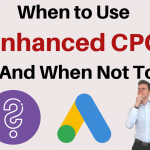Manual CPC Bidding – The Advantages and Disadvantages
With the improvements that have been seen to the efficacy of the smart bidding strategies on offer by Google, Manual CPC bidding is becoming less and less relevant.
Advertisers are seeing more and more, that campaigns that are using automated bidding strategies such as Target CPA are able to outperform those that are using manually optimised bids.
However, despite this, there are still instances where the use Manual CPC bidding is not only more effective, but essential.
Within this article we’ll review the advantages and disadvantages of using Manual CPC bidding, and the situations where it should, and should not be used.
Disadvantages of Manual CPC Bidding
Potentially Poorer Performance
Google’s smart bidding strategies are able to tap into a wealth of data on the behaviour of users in order to help drive calculations for bids.
With this in mind, it is no surprise that many advertisers are seeing improved performance when transitioning from manual CPC to a smart bidding strategy such as target CPA.
Requires Experience and Expertise
Knowing how to effectively optimise bids based on the individual performance of keywords requires a certain level of experience and expertise.
This can make setting manual bids difficult for those who have not yet developed a high level of proficiency with Google Ads.
It’s Manual…
An obvious downside to using Manual CPC bidding is that… well, it’s manual. Account managers will be required to log in on a regular basis in order to review performance and make adjustments to the bids accordingly.
This doesn’t just include keyword bids, but also bid adjustments for device, schedule, locations, and demographics.
Time Consuming
The time required for continually optimising keyword bids adds up over time. If using an automated bidding strategy, this time could instead be invested in further analysis and development of the campaign’s strategy.
Advantages of Manual CPC Bidding
New Campaigns With Little or No Conversion Data
Newly setup campaigns that do not yet have any performance or conversion data cannot take advantage of smart bidding strategies.
Automated bidding strategies such as Target CPA require campaigns to have at least 30 conversions within the last 30 days in order for them to work effectively.
In this circumstance Manual CPC bidding gives the advertiser the ability to optimise their bids without having to wait for a certain volume of conversions.
When Automated Strategies Can’t Cut It
There are instances where automated/smart bid strategies are just not able to meet the campaign’s targets or objectives.
This is why it is important to test the effectiveness of smart bidding strategies versus manual bids.
When smart bidding strategies are failing to meet targets, the remedy is to optimise bids the old-fashioned way.
Full Control
Manual CPC is the only bidding strategy that gives advertisers full control over their bidding. This is as long as the option for Enhanced CPC is unchecked, of course.
This gives the advantage of not having to rely on the efficacy and reliability of Google’s automated bidding strategies, and gives the ability to fully control costs, and ensure that bids are being optimised in-line with the campaign’s objectives.
Conclusion
Manual CPC is not better, or worse, than any of the other bidding strategies available. Its comparable efficacy will depend on the individual circumstances of the campaign in question.
For this reason, Manual CPC should be tested along with the other bidding strategies which are applicable to the objectives and targets of the campaign.
There will however, at least for the time being, always be circumstances where the Manual CPC bidding strategy will be relied upon.



